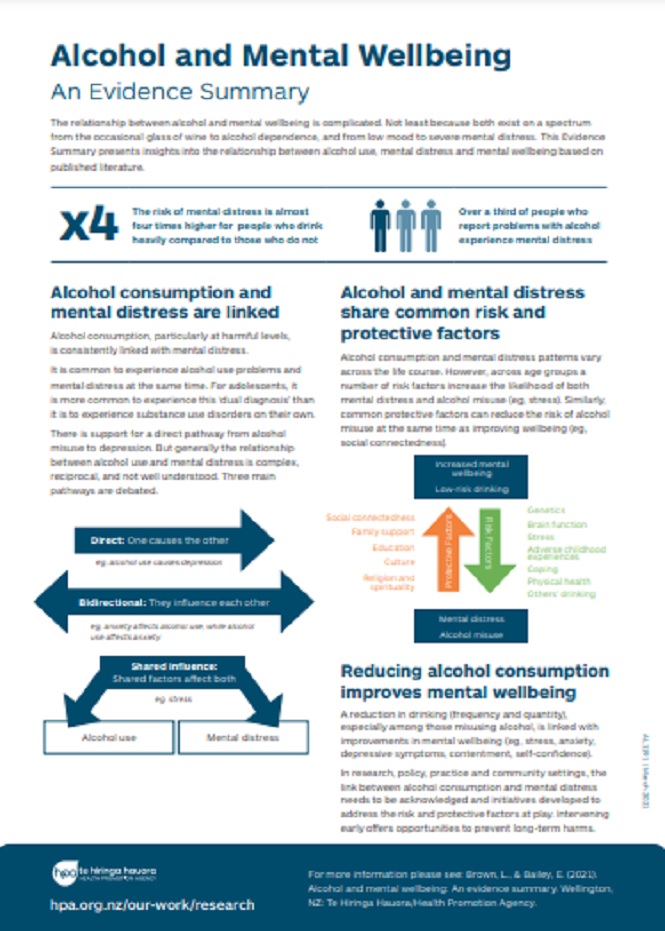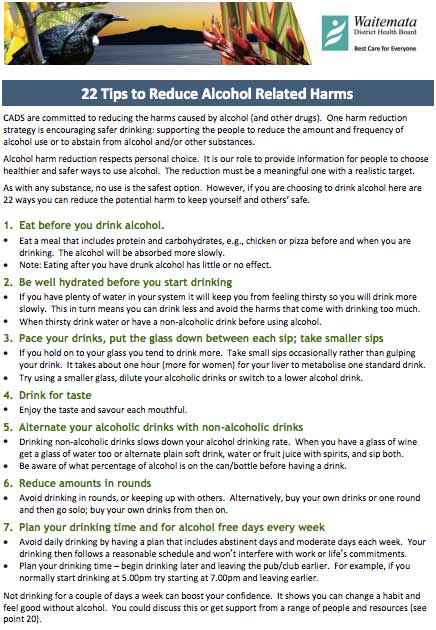Video: Alcohol and mental health
(Drink Aware UK, 2021)

Low or no data? Visit zero.govt.nz, scroll down the page then click on our logo to return to our site and browse for free.

(Drink Aware UK, 2021)
Alcohol can affect all parts of your body, including your brain and your brain chemistry. Your brain functions best when its chemicals and processes are in balance. Alcohol disrupts that balance. It changes the neurotransmitters, which are the chemicals that help transmit signals from one nerve (or neuron) to another.
The relaxed feeling you get when you have your first drink is the sign that your brain chemistry is starting to change. The alcohol is depressing the part of the brain associated with inhibition, so you may feel more confident and less anxious.
Drinking also lowers the levels of serotonin in your brain – a chemical that helps to regulate your mood. When this happens, negative emotional responses, such as anger, aggression, anxiety or depression, can start to take over.
This not only happens each time you drink, but it can also have an accumulative effect so that if you drink regularly, your serotonin levels get lower and lower. Rather than improving your mood, alcohol can gradually make it worse.
The relationship between alcohol and mental health is complex. Alcohol can negatively affect your mood and mental wellbeing, your mental state can affect your use of alcohol and it may be that other factors affect both your drinking behaviour and your mental health and wellbeing.
Anxiety and depression are more common in heavy drinkers and heavy drinking is more common in those with anxiety and depression. Alcohol is a major risk factor for suicide ideation, suicide attempt and complete suicide. Over a third of people who have completed suicides in Aotearoa New Zealand had also consumed alcohol.
If you experience mental health issues, you might find you use alcohol to temporarily feel better. Drinking alcohol is sometimes used to cope, or as a coping strategy. You can find yourself gradually drinking more alcohol, more often.
However, because of how it changes your brain chemistry, alcohol can contribute to and worsen symptoms of depression, anxiety, stress, mood disorders, suicidality, self-harm and psychosis. Also, because it removes inhibitions and increases recklessness, it can also put you more at risk of harming yourself, your whānau and others around you.
Alcohol can also interact with any medication you are taking for mental health or other conditions. It may be important not to drink alcohol at all, or to limit your intake if you are taking certain medicines. Check the instructions you were given when your medicines were prescribed, or ask your doctor or pharmacist if you are not sure.
If you have a mental health condition and you use alcohol as a coping strategy, talk about it with your healthcare provider.
If you don’t have a mental health condition but are concerned your drinking is slowly depressing your mood or increasing your stress, you can lower your risk of harm and take charge of your drinking by using the strategies described on the alcohol overview page which also provides maximum alcohol recommendations.
This video may take a few moments to load.
(Drink Aware, UK, 2020)
Develop regular habits that reduce the build-up of stress and tension, such as:

Image credit: 123RF
Help for families, whānau, friends(external link)(external link) Health New Zealand | Te Whatu Ora
Family Drug Support(external link)(external link) 0800 337 877 9am–10pm, 7 days a week
Alcohol(external link) Mental Wealth, NZ
alcohol.org.nz(external link)
Alcohol and depression(external link) Royal College of Psychiatrists, UK, 2015
Online NZ support to strengthen wellbeing
Ignite(external link) NZ
Alcohol and other drug support services
Alcohol and your body(external link)
Alcohol and Mental Wellbeing (external link)Health Promotion Agency, NZ, 2021
22 tips to reduce alcohol related harms (external link)Community Alcohol and Drug Services, NZ, 2015
Check alcohol use in patients with depression, anxiety and other mental illnesses to assess whether it is causing mood disorders or exacerbating an underlying mental health condition. Addressing the use of alcohol may resolve some depression and anxiety.
An evidence summary – alcohol and mental wellbeing(external link) [PDF, 695 KB] Health Promotion Agency, NZ, 2021
Alcohol misuse – how to help patients in primary care(external link)(external link)(external link) BPAC, NZ, 2016
Mental Health Issues: Alcohol Use Disorder and Common Co-occurring Conditions(external link) National Institute on Alcohol Abuse and Alcoholism, US

Health Promotion Agency, NZ, 2021

Community Alcohol and Drug Services, NZ, 2015
Credits: Healthify Editorial Team
Reviewed by: Luisa Silailai, Programme Manager for Alcohol Harm Minimisation and accredited DAPAANZ Clinical Supervisor/Alcohol and other Drugs and Problem Gambling Clinician.
Last reviewed:
Page last updated: